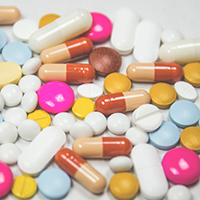Antibiotics self-medication among medical students in a new medical college at Abubakar Tafawa Balewa University Bauchi, Nigeria

Submitted: 13 September 2018
Accepted: 22 August 2019
Published: 19 February 2020
Accepted: 22 August 2019
Abstract Views: 1058
PDF: 564
Publisher's note
All claims expressed in this article are solely those of the authors and do not necessarily represent those of their affiliated organizations, or those of the publisher, the editors and the reviewers. Any product that may be evaluated in this article or claim that may be made by its manufacturer is not guaranteed or endorsed by the publisher.
All claims expressed in this article are solely those of the authors and do not necessarily represent those of their affiliated organizations, or those of the publisher, the editors and the reviewers. Any product that may be evaluated in this article or claim that may be made by its manufacturer is not guaranteed or endorsed by the publisher.

 https://doi.org/10.4081/pjm.2019.25
https://doi.org/10.4081/pjm.2019.25



